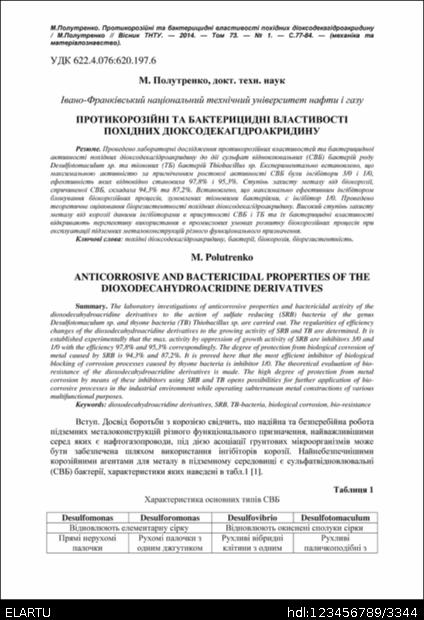Palun kasuta seda identifikaatorit viitamiseks ja linkimiseks:
http://elartu.tntu.edu.ua/handle/123456789/3344

Täiskirje
| DC väli | Väärtus | Keel |
|---|---|---|
| dc.contributor.author | Полутренко, Мирослава Степанівна | uk |
| dc.contributor.author | Polutrenko, M. | uk |
| dc.date.accessioned | 2014-08-31T14:46:21Z | - |
| dc.date.available | 2014-08-31T14:46:21Z | - |
| dc.date.created | 2014-03-20 | uk |
| dc.date.issued | 2014-03-20 | uk |
| dc.identifier.citation | Полутренко М. Протикорозійні та бактерицидні властивості похідних діоксодекагідроакридину / М. Полутренко // Вісник ТНТУ — Тернопіль : ТНТУ, 2014. — Том 73. — № 1. — С 77-84. — (механіка та матеріалознавство). | uk |
| dc.identifier.citation | Polutrenko M. Anticorrosive and bactericidal properties of the dioxodecahydroacridine derivatives / M. Polutrenko // Bulletin of TNTU — Ternopil : TNTU, 2014. — Volume 73. — No 1. — P 77-84. — (mechanics and materials science). | uk |
| dc.identifier.issn | 1727-7108 | - |
| dc.identifier.uri | http://elartu.tntu.edu.ua/handle/123456789/3344 | - |
| dc.description.abstract | Проведено лабораторні дослідження протикорозійних властивостей та бактерицидної активності похідних діоксодекагідроакридину до дії сульфат відновлювальних (СВБ) бактерій роду Desulfotomaculum sp. та тіонових (ТБ) бактерій Thiobacillus sp. Експериментально встановлено, що максимальною активністю за пригніченням ростової активності СВБ були інгібітори 3/0 і 1/0, ефективність яких відповідно становила 97,8% і 95,3%. Cтупінь захисту металу від біокорозії, спричиненої СВБ, складала 94,3% та 87,2%. Встановлено, що максимально ефективним інгібітором блокування біокорозійних процесів, зумовлених тіоновими бактеріями, є інгібітор 1/0. Проведено теоретичне оцінювання біорезистентності похідних діоксодекагідроакридину. Високий ступінь захисту металу від корозії даними інгібіторами в присутності СВБ і ТБ та їх бактерицидні властивості відкривають перспективу використання в промислових умовах розвитку біокорозійних процесів при експлуатації підземних металоконструкцій різного функціонального призначення. | uk |
| dc.description.abstract | The laboratory investigations of anticorrosive properties and bactericidal activity of the dioxodecahydroacridine derivatives to the action of sulfate reducing (SRB) bacteria of the genus Desulfotomaculum sp. and thyone bacteria (TB) Thiobacillus sp. are carried out. The regularities of efficiency changes of the dioxodecahydroacridine derivatives to the growing activity of SRB and TB are determined. It is established experimentally that the max. activity by oppression of growth activity of SRB are inhibitors 3/0 and 1/0 with the efficiency 97,8% and 95,3% correspondingly. The degree of protection from biological corrosion of metal caused by SRB is 94,3% and 87,2%. It is proved here that the most efficient inhibitor of biological blocking of corrosion processes caused by thyone bacteria is inhibitor 1/0. The theoretical evaluation of bio- resistance of the dioxodecahydroacridine derivatives is made. The high degree of protection from metal corrosion by means of these inhibitors using SRB and TB opens possibilities for further application of bio- corrosive processes in the industrial environment while operating subterranean metal constructions of various multifunctional purposes. | uk |
| dc.language.iso | uk | - |
| dc.publisher | Тернопільський національний технічний університет ім. Івана Пулюя | - |
| dc.subject | похідні діоксодекагідроакридину | uk |
| dc.subject | бактерії | uk |
| dc.subject | біокорозія | uk |
| dc.subject | біорезистентність | uk |
| dc.subject | dioxodecahydroacridine derivatives | uk |
| dc.subject | SRB | uk |
| dc.subject | TB-bacteria | uk |
| dc.subject | biological corrosion | uk |
| dc.subject | bio-resistance | uk |
| dc.title | Протикорозійні та бактерицидні властивості похідних діоксодекагідроакридину | uk |
| dc.title.alternative | Anticorrosive and bactericidal properties of the dioxodecahydroacridine derivatives | uk |
| dc.type | Article | - |
| dc.rights.holder | © „Вісник Тернопільського національного технічного університету“ | uk |
| dc.coverage.placename | Тернопіль | uk |
| dc.status | Опубліковано раніше | - |
| dc.subject.udc | 622.4.076 | uk |
| dc.subject.udc | 620.197.6 | uk |
| Asub kollektsiooni(de)s: | Вісник ТНТУ, 2014, № 1 (73) | |
Failid selles objektis:
| Fail | Kirjeldus | Suurus | Formaat | |
|---|---|---|---|---|
| TNTUB_2014v73n1_M_Polutrenko-Anticorrosive_and_bactericidal_77-84.pdf | 220,56 kB | Adobe PDF | Vaata/Ava | |
| TNTUB_2014v73n1_M_Polutrenko-Anticorrosive_and_bactericidal_77-84.djvu | 162,13 kB | DjVu | Vaata/Ava | |
| TNTUB_2014v73n1_M_Polutrenko-Anticorrosive_and_bactericidal_77-84__COVER.png | 430,15 kB | image/png | Vaata/Ava |
Kõik teosed on Dspaces autoriõiguste kaitse all.